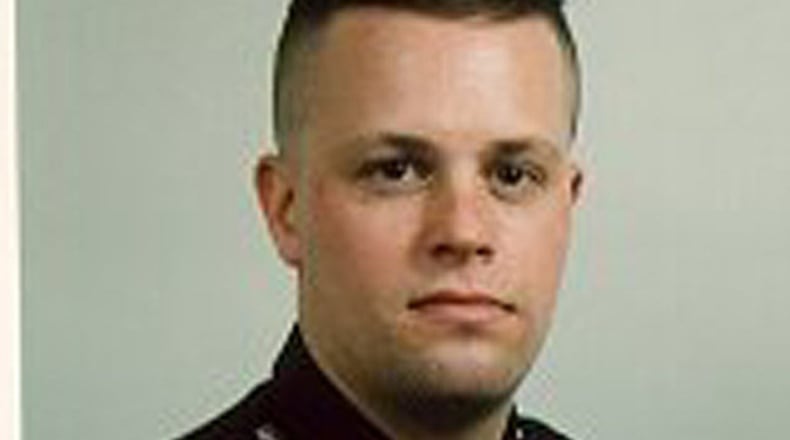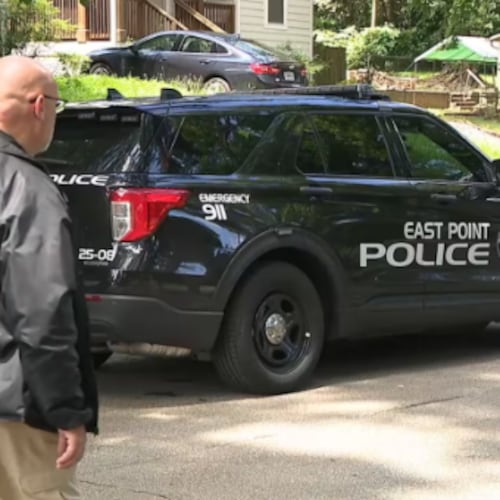The following story appeared in the Dec. 16, 2003 edition of The Atlanta Journal-Constitution
Pat Cocciolone struggles to say ”Christmas.”
It has taken her years to get close to the correct pronunciation.
“God, it was a hard one, ” says the 44-year-old former Atlanta police officer, who in 1997 was shot in the head during an ambush. Fellow officer and friend John “Rick” Sowa, 28, was killed.
“Before I learned to say ‘Christmas, ’ I had to learn how to say ‘church.’ For a long time I couldn’t say ‘church.’ I would say ‘God’s house.’
“Sorta like a little kid, huh?”
On Oct. 12, 1997, Gregory Paul Lawler, then 44, stood over Cocciolone and fired into her body. When she awoke in the hospital, she couldn’t talk. There was only gibberish. She couldn’t read or write.
Cocciolone, who was shot six times, loved being a police officer. She had been on the Atlanta police force for 11 years when she and Sowa were called to a Buckhead apartment because of a domestic disturbance. Lawler, who was later convicted of murder, fired on them with a rifle.
Cocciolone, then 38, lay wounded on the ground, watching Lawler approach. “I was calling out to John, but he never called back, ” she says. “He killed John, and then he went back to me. He shot me a couple of more times. He stood right over me to shoot me again, trying to make sure I would die, but I turned at just the right time. Otherwise I would have died.”
Cocciolone’s career is over. A bullet savaged the section of her brain that controls language, and she is diagnosed with aphasia, a condition that impairs her ability to comprehend and use language.
At first, she couldn’t even remember her name. When she saw “Cocciolone” on a patient ID wristband, she was befuddled. “I thought it was a joke, ” she recalls. “I didn’t think anybody has a last name like ‘Coach Alone.’ “
Religious faith helped
During a recent therapy session, Cocciolone struggled to read a Christmas letter from a sister-in-law in Michigan, grasping to recognize and say words such as “lacrosse, ” “saga” and “previous.”
“This is going to take forever, ” she says.
But while reading is extremely difficult, she can carry on a spirited conversation. Her outlook, religious faith and humor have helped her recovery, doctors say. She makes light of her embarrassing moments.
Like the time she tried to order fish at a restaurant and a synonym for excrement popped out of her mouth. The waitress was unfazed.
“She looked at me and said, ‘I’m sorry, ma’am, we’re all out… . Would you like something else?’ ” Cocciolone says.
She says she has battled adversity for most of her life. As an openly gay police officer, she says, she faced bias on the police force. As an openly gay Catholic, she felt forced to leave the church.
“It’s hard to be gay and be Catholic —- you can’t do anything, ” she says. “My mom wanted me to become a nun. I said, ‘I’m sorry, that’s not what I’m looking for.’ “
In 1999, Cocciolone left the Shepherd Center, where she had begun rehabilitation, reading only a few simple words such as “cat, ” said her speech therapist, Leila Hartley.
In 2000 at Lawler’s trial, at which he was sentenced to death, Cocciolone’s halting testimony brought tears from spectators as she struggled to complete sentences and say her name. She referred to Lawler as “that man.”
The Shepherd Center warned her not to expect more. “I said, ‘No, I know I can do better.’ “
She credits Hartley with helping her retrieve the words hidden in her mind and learn to use them. Her doctor calls the progress remarkable.
“This is a woman who couldn’t talk at all, ” says Dr. Donald Peck Leslie, the center’s medical director. “I would never have thought she would get to where she has gotten today. I am still amazed by this woman.”
Atlanta police Officer Bud Watson, one of her training officers at the police academy in the late 1980s, says Cocciolone has been resolute.
“She showed me a tremendous amount of guts and determination, ” Watson says. ”She was one of my best recruits. And she is still the same bright and cheerful person to be around. That has not changed. She is just an inspiration. She is my hero.”
Cocciolone says she tries to remain upbeat in public. Being a whiner, she says, doesn’t win friends. But it hasn’t been easy, and occasionally the bitterness shows behind her jokes and laughter.
She loved being a police officer. But even if she hadn’t suffered a brain injury in the shooting, her career would have been over. One of the six bullets that struck her took a chunk out of her hip bone and damaged nerves, making it difficult to walk. She uses a combination of medications and acupuncture to fight the pain, which she says can be excruciating.
Returning to the scene
Early on, she had to fight the city for more than $4,000 in worker’s compensation payments, which the city finally admitted in 2000 it owed her. The city blamed the oversight on a miscalculation by an employee.
Her personal life has suffered. She broke off with her partner and now lives alone in Lilburn.
She has battled financial problems and depression. And, for a while, there were recurring nightmares about the night Sowa died.
About once a month she returns to Morosgo Way, near Lindbergh Plaza on Piedmont Road, where the officers answered the fatal call.
She picks up cigarette butts and trash around a small memorial in which a stone marks the date Sowa died and the date on which a Fulton County jury decided Lawler should be executed.
Sometimes she sits in her car, thinking about Sowa and about her own life. Occasionally, she’ll look at the spot where neighbors planted a sapling in what turned out to be an ironic tribute to her.
“The tree didn’t make it, ” she says. “The tree died.”
About the Author
The Latest
Featured


